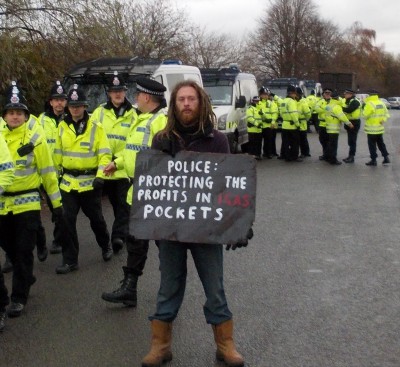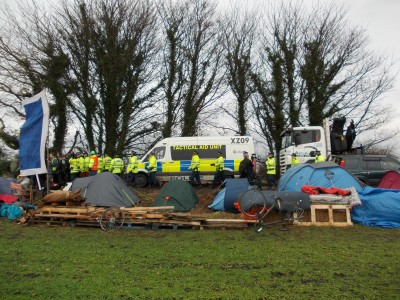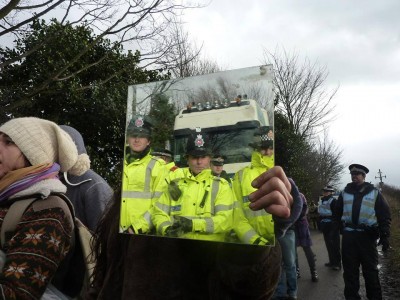 By Netpol: The Network for Police Monitoring
By Netpol: The Network for Police Monitoring
In February 2014, the Chief Constable of Greater Manchester Police, Sir Peter Fahy, was widely reported complaining that anti-fracking protesters at Barton Moss, Salford, were “constantly try and provoke officers and are personally insulting to them” and insisting the policing operation was entirely impartial. He told the press:
“We have to be there to ensure the protest is peaceful and to balance the rights of the protesters and those wanting to carry out drilling on the site which are both lawful activities. The police are stuck in the middle.”
But was Greater Manchester Police (GMP) really just a neutral participant, placed in the difficult position of negotiating the competing demands of protesters and the drilling company IGas? The release of the Memorandum of Understanding (![]() , 695 kB) that GMP signed with the company, following a Freedom of Information request by Netpol, suggests otherwise.
, 695 kB) that GMP signed with the company, following a Freedom of Information request by Netpol, suggests otherwise.
As well as the police and IGas, the memorandum was signed in December 2013 by landowners Peel Holdings along with others including Salford City Council and sets out the “ongoing cooperation and coordination between the Parties in order to promote and contribute to their mutual interests”.
Instead of simply clarifying accountability for issues like site safety or contingency planning, what it reveals is that far from balancing equally the needs of both IGas and its local opponents, one side – the industry leader with government support that this year purchased rival Dart Energy for £117m – had insider access to Gold and Silver senior police command meetings, daily briefings or video conferences with GMP’s Silver Commander and shared police and local council information and intelligence.
Indeed, as the appendix on its responsibilities makes clear, IGas was handed control of the message pushed out to the media by acting as the lead on all communications, “both proactive and reactive”, with the support of GMP’s 40 strong Corporate Communications Branch.
Protesters, meanwhile, were faced with repeated dubious arrests and a raid under the Terrorism Act 2000 in search of a flare that attracted widespread local and national press coverage but mysteriously failed to produce any actual evidence.
The memorandum confirms the growing levels of nationwide police collaboration in response to opposition to unconventional energy extraction. It borrows heavily from a similar Memorandum of Understanding (![]() , 110 kB) drawn up earlier in 2013 for the policing operation at Balcombe in West Sussex – large sections are lifted word for word. Sussex Police briefed other police forces and pioneered placing its PR department at the disposal of a fracking company – like IGas, Cuardrilla was allowed to lead on media communications. However, the Manchester memorandum goes further in specifically mentioning liaison “with counterparts in Sussex and Lancashire who have been involved in the policing and management of protests”.
, 110 kB) drawn up earlier in 2013 for the policing operation at Balcombe in West Sussex – large sections are lifted word for word. Sussex Police briefed other police forces and pioneered placing its PR department at the disposal of a fracking company – like IGas, Cuardrilla was allowed to lead on media communications. However, the Manchester memorandum goes further in specifically mentioning liaison “with counterparts in Sussex and Lancashire who have been involved in the policing and management of protests”.
 Sir Peter Fahy’s insistence that his force’s relationship with IGas was neutral and impartial has been weakened further by comments made by Deputy District Judge Saunders at Manchester Magistrates Court on 3 July. Acquitting Barton Moss defendants, the judge accused Greater Manchester Police of exceeding its powers by intervening on IGas’ behalf during a civil trespass and of “acting as civil enforcement officers” for the company.
Sir Peter Fahy’s insistence that his force’s relationship with IGas was neutral and impartial has been weakened further by comments made by Deputy District Judge Saunders at Manchester Magistrates Court on 3 July. Acquitting Barton Moss defendants, the judge accused Greater Manchester Police of exceeding its powers by intervening on IGas’ behalf during a civil trespass and of “acting as civil enforcement officers” for the company.
Most recently, the Chief Constable’s claim that “for all the hundreds of hours of policing we have received only 21 complaints, five of which are from the same person” has been undermined by another Freedom of Information request (![]() , 131 kB) by Netpol that GMP initially rejected, but was received on 21 July after we requested an internal review. It shows there have actually been 77 complaints – and 40% of them are over the misuse of force by GMP officers.
, 131 kB) by Netpol that GMP initially rejected, but was received on 21 July after we requested an internal review. It shows there have actually been 77 complaints – and 40% of them are over the misuse of force by GMP officers.
Netpol’s campaigning work on the policing of anti-fracking protests, funded for the next two years by the Joseph Rowntree Reform Trust Ltd, will seek further evidence of potential collusion between the police and unconventional energy companies to deter and undermine anti-fracking protests. Forcing campaigners to take on not only the shale gas and oil companies and their multinational partners but the full resources of the state is unacceptable in a democratic society.


1 ping
[…] Netpol, the Network for Police Monitoring, starts to investigate the relationship between IGas and Greater Manchester Police. […]